Charles Lloyd: A Living Legend Live at the Lobero
Jazz Great Celebrates His 85th Birthday
and the Historic Theater’s 150th Anniversary
By John Zant | Photos by Matt Perko | March 9, 2023
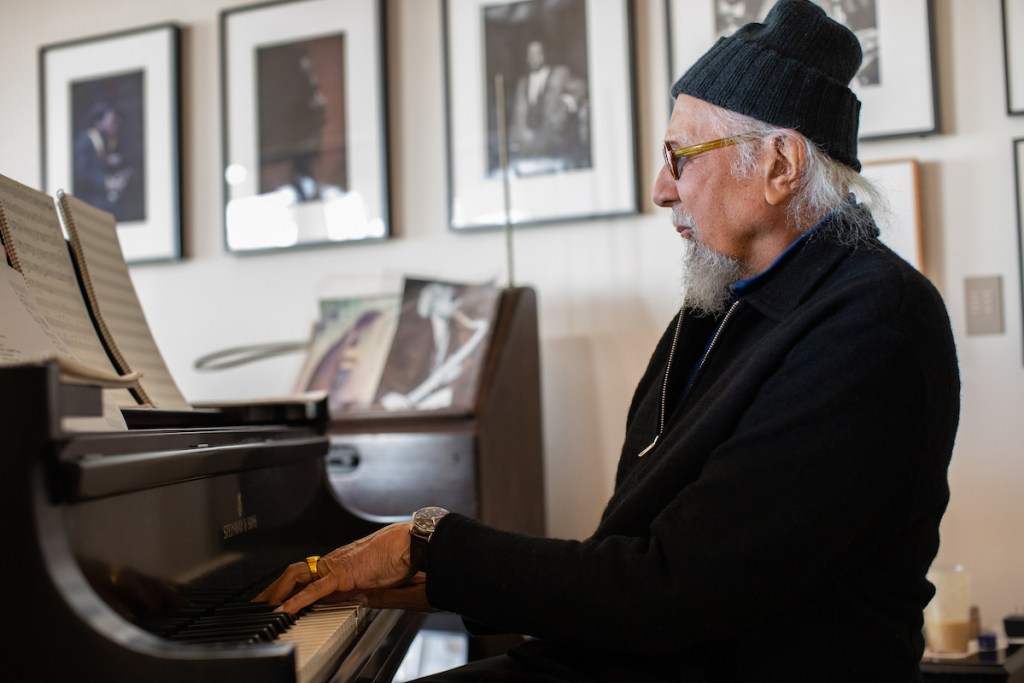
It was an exciting yet somewhat intimidating assignment for a sports writer: Compose a story about Charles Lloyd, a certified luminary in the world of jazz, on the momentous occasion of his 85th birthday, which will be commemorated in conjunction with the year-long 150th anniversary of the Lobero Theatre, a cherished citadel of culture in Santa Barbara.
Lloyd, still vigorously blowing notes through the tenor saxophone and flute, takes the stage on Friday, March 10 — leading a fabulous quartet including pianist Jason Moran, bassist Larry Grenadier, and drummer Brian Blade.
Blade is making his debut with Lloyd, adding his name to the dozens of musicians who populate the NEA (National Endowment for the Arts) Jazz Master’s vast repertoire of concerts and recordings.
The first thing one notices on a visit to the Montecito home where Lloyd resides with his wife, Dorothy Darr, are the walls filled with historical photos and posters.
“These are my deities when I’m working on music,” Lloyd says, pointing to images of Art Tatum, Coleman Hawkins, Lester Young, Charlie Parker, Duke Ellington, and Johnny Hodges.
The serenity of the location also inspires him. “There was a spiritual thing when I saw this land,” Lloyd says. “I’ve been living in nature going on 50 years. It heals me and spills fresh water on me.”
He continues to move around the room. “There’s my hero Lady Day,” he says. “I had the idea to get to New York and marry Billie Holiday, but I was too young. I not only heard her, but she was just singing to me. She was mine. But I didn’t get there in time.”
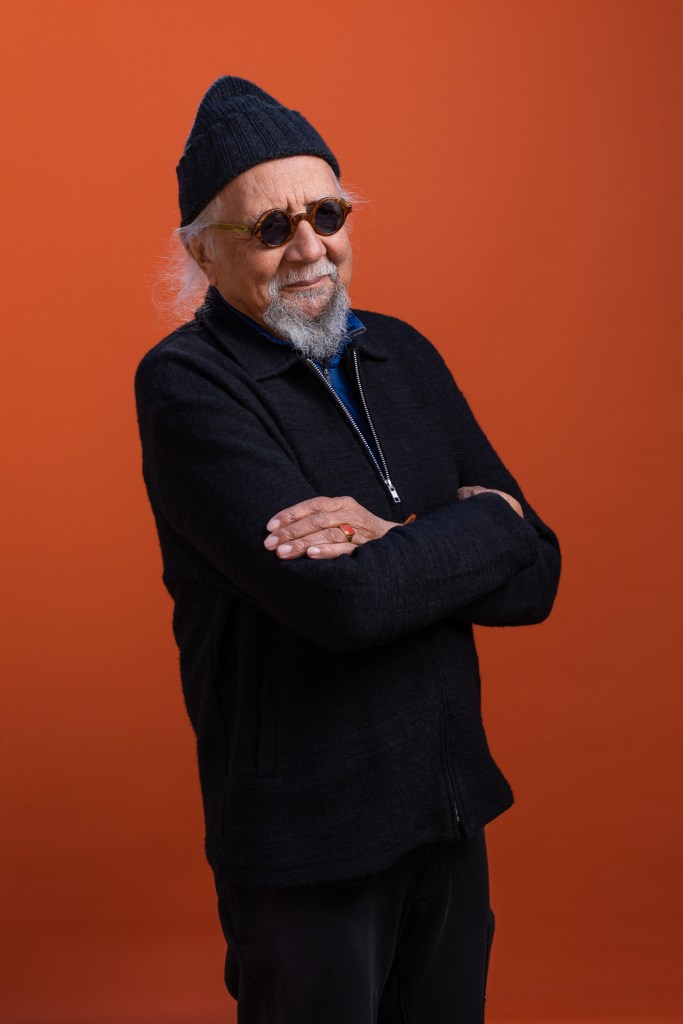
“I’m still not good enough to quit,” says Charles Lloyd (above), who will celebrate turning 85 at his concert at the Lobero. “I have lots of experience. The blessing for me is the game is mine. I’m still working on it.” | Credit: Matt Perko
He lingers over a photo of Booker Little, saying, “My best friend in high school [Manassas High in Memphis].” Little was a trumpet player who made a huge impact on Lloyd during his short life. “Clifford Brown was his guy,” Lloyd says of another young trumpet trailblazer. “When Clifford Brown died in an accident, Booker came home from college at Christmastime. We were hanging out, and he started crying. ‘Clifford’s gone; why couldn’t it have been me?’ How many 18-year-olds would have said that?” Little later died of an illness at 23. Before then, Lloyd says he stayed with him in New York. “Booker checked me out: ‘What’s going on?’ I was ready to get in the fast lane. He said, ‘This is about character.’ That just stopped me.”
Lloyd made a big splash with his band that featured Keith Jarrett, Jack DeJohnette, and Cecil McBee. They recorded the acclaimed live album Forest Flower in 1966. During that time, Harry Edwards, who was to become a good friend, discovered him.
Edwards, an 80-year-old sociologist, is a longtime consultant for the San Francisco 49ers and Golden State Warriors. He can talk about sports and jazz. “Jazz is sports made audible,” he says. “Sports is jazz made visible to the naked eye.”
It’s been said that sports do not build character; they reveal it. The same can be said about jazz, and Edwards found Lloyd’s music to reveal a deep and compassionate man. He needed that music, Edwards says, after enduring the fallout from leading the athletes’ rights movement that culminated in the iconic medal-stand demonstration of Tommie Smith and John Carlos (joined by Australian Peter Norman) at the 1968 Olympic Games.
“After 1968, I was in a knot,” Edwards says. “The police, FBI, death threats, turmoil of Black power. But we got it done. Smith, Carlos, the whole track team were trying to say something that needed to be heard. We’ve had poverty, bombings, lynching, assassinations, but America is better than that. The whole world was talking about it. It’s etched into history.
“After that, I overdosed on Charles Lloyd and his music. He brought me back down. We got to embrace each other,” says Edwards.
Edwards traced the reverse arc of Lloyd’s musical life: “Forest Flower sold a million albums. He played at the Fillmore with rock bands to packed houses, but his music wasn’t crossover. Charles swept up everybody, engaged everybody, and carried them along. But then it seemed he was losing touch with himself and music, where he wanted to go with it. Whatever it was, he disappeared, and you thought that was the end of the journey. Then you found out he hasn’t left the station. He came back with all his humanity, and at 85 he’s still creating. You don’t do that just because your joints and lungs allow you to reach the notes. What this tells me: This is not a function of age. It’s something much deeper than that. When they close the box on him, it will squeak a jazz note. Until then, he’ll keep right on blowing.”
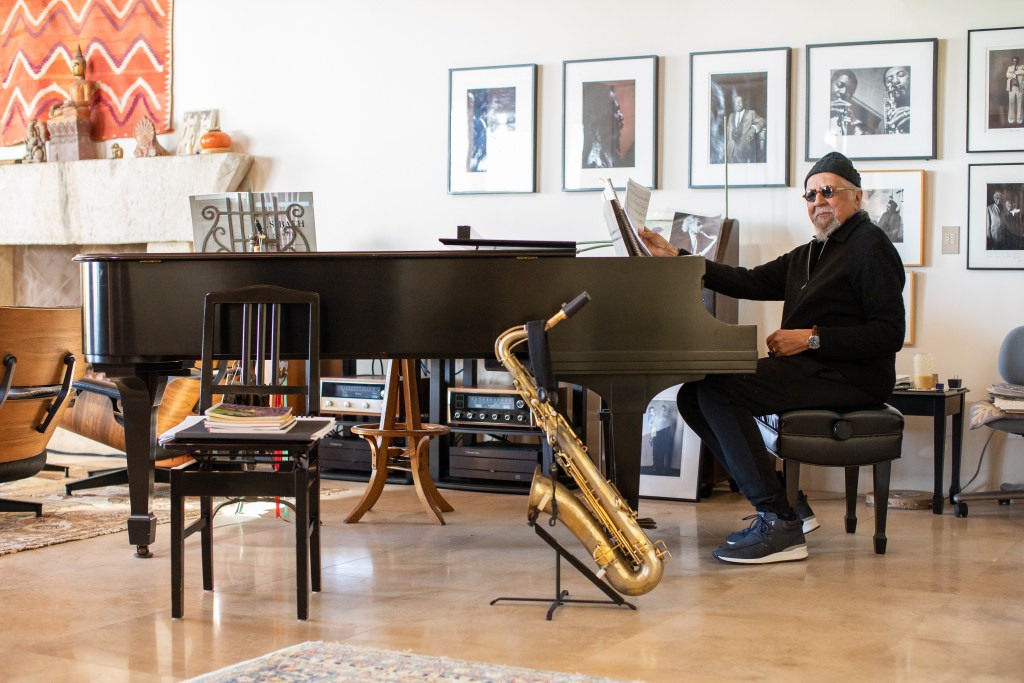
At a time when people are declaring who’s the GOAT (Greatest of All Time) in various fields, Lloyd must be in the conversation when it comes to the tenor saxophone. Certainly he is among the best still performing, having outlasted Sonny Rollins and Wayne Shorter. The DownBeat Critics 2022 poll ranked him number one. As far as Lloyd is concerned, “My all-time greatest is Prez, Lester Young. He was the greatest poet in the instrument. Of course, Coleman Hawkins is up there. I sat at his feet at the Vanguard. [John] Coltrane mastered the instrument and the spirituality. People compared me to ’Trane. That’s why I moved to New York, because of ’Trane and Sonny Rollins too. I had many decades to go. Those guys set such a high standard. They were the modern masters. They inspired me greatly.”
Asked his opinion on the basketball debate — LeBron James, Kareem Abdul-Jabbar, Michael Jordan — Lloyd chooses Bill Russell, who led the Boston Celtics to 11 NBA championships in 13 years. “Nobody else comes close,” Lloyd says. “When I was with Cannonball, we’d go to Boston. Russell had to put up with so much racism there. I told [Charles] Barkley one day — we were staying in the same hotel in New York — that Russell’s my guy. He said he’s the master.”
It’s not surprising that Lloyd would hold a dominant player during his youth in such high esteem. It’s the same with the long-gone jazz artists. He is animated by their spirits.
“As I’ve become an elder more and more,” Lloyd says, “Lester Young and my first love, Billie Holiday — they come back and sing in my heart. I’m still not good enough to quit. I have lots of experience. The blessing for me is the game is mine. I’m still working on it.”
He adds, “I’m just drunk, I’m still drunk, and that’s a beautiful thing, if I can stay here and send out my messages to the world.” This speaks of a healthy intoxication, nourishing rather than dissipating. It calls to mind the words of French poet Charles Baudelaire: “Get drunk! Stay drunk! On wine, virtue, poetry, whatever!”
Santa Barbara audiences have witnessed the flourishing of Lloyd’s character. Friday’s concert will be his 18th at the Lobero since 1981. Steve Cloud, who has promoted all of them, says no other artist has made more appearances on that stage.
This concert was a couple of years in the making, says Darr, who minds her husband’s business affairs. “Charles said, ‘I want to make a recording of tenderness with Jason and Larry and Brian Blade. I need something to do with tenderness for the world.’ They all said yes. Then the challenge was finding overlapping dates. It took about a year to get a date, and it coincided with the Lobero anniversary.”
All three of the musicians who will perform with Charles Lloyd at the Lobero expressed their reverence for the leader and his music.
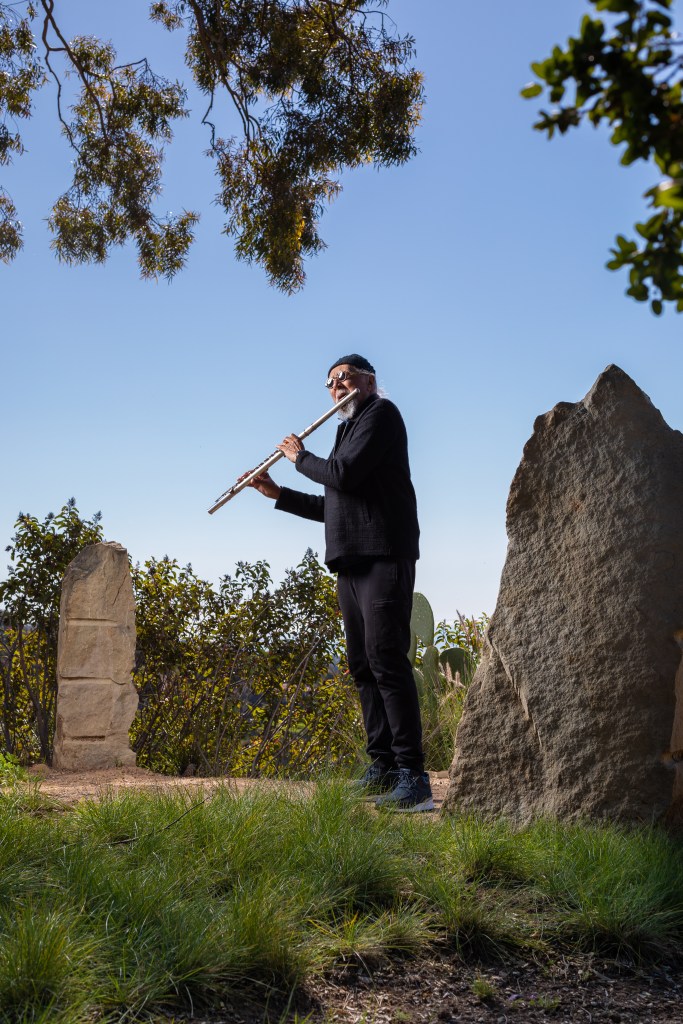
“When they close the box on him, it will squeak a jazz note. Until then, [Charles Lloyd] will keep right on blowing,” says Harry Edwards. | Credit: Matt Perko
Pianist Jason Moran, 48, from Houston, has performed and recorded regularly with Lloyd since 2008. He received a MacArthur “genius grant” in 2010. Moran says, “Charles is from an era where people like to sing, and the way he plays, he’s aiming to sound like Billie Holiday sings … Heartbreak, joy, the cavalier quality that falls out of her mouth into your soul … he wanted to put those qualities in the saxophone. It has a dive-into-your-chest quality; then he gives it a falsetto that sings like a bird. He can chant, shout, squeal, whisper. In the end, it’s all spiritual.
“America wants polar opposites — this against that — but his music offers, at every turn, solo to solo, a way to be in-between. It’s an undulating landscape. As a rhythm section, we undulate the ground and give [Charles] sand, ocean, iceberg, dunes, tundra … give him different places to walk in, set his soul on top of,” says Moran.
He continues waxing rhapsodically about Lloyd. “He hears music everywhere. It doesn’t have to be a saxophone. He puts the saxophone down, picks up maracas, bells…. He’s been thinking about these years of his life for a while, where does it go…. All artists are required to be sensitive to [the] environment, from harsh to glorious. Sometimes tenderness has to be displayed.”
Bassist Larry Grenadier, 57, a Bay Area native, tours with pianist Brad Mehldau. They both made ECM recordings with Lloyd in 2000 and 2001. Grenadier says, “The stuff Charles plays is amazing, one of a kind. Jazz is about different personalities, and all he asks from people is to be themselves, create, put out stuff, and accept what comes back. He lays out a creative environment. Group interplay is going on constantly. It’s not complex. You don’t have to rehearse, just connect, be honest. Charles surrounds himself with people who share those ideas of making music, so I don’t have to worry while playing.
“I’ve never had a gig with him when you leave the stage and don’t feel satisfied. It’s cleansing to play with him. The Lobero is a great place. It’s best to play in smaller theaters or clubs.”
On Blade making his first appearance with Lloyd, Grenadier says, “He has a really wide range of expression. You can take the music many different places. He’s one of the great drummers of the last 50 years.
I always thought that would be an amazing combination. It’s finally happening. Everybody’s going to show up, a very creative band. It’s always like that with Charles.”
Drummer Brian Blade, 52, from Shreveport, Louisiana, who was voted the number-one drummer in jazz on the 2022 DownBeat Readers Poll, says, “Charles is just such a unique voice, a presence not only in the music world, but in the world itself. He offers great light and joy. This is a privilege and honor. I’ve seen him many times, listened to his recordings, and first saw him in a film with Cannonball Adderley. He keeps searching and revealing more of who he is and what he loves.
“Thinking about the history of music Charles has created … with Billy Higgins, Roy Haynes, Jack DeJohnette … I’m walking in their footsteps. I’ll be giving my best, hopefully supplying what is needed in the moment. Larry [Grenadier], wow, we’ve played quite a bit. I recently played with Jason [Moran] in tribute to Ron Miles…. This will be great company,” says Blade.
He adds, “The circle is completed by the listeners: They share, give back — even in silence. Being that this is Charles’s community, I’m sure it will be a resounding evening.”
Charles Lloyd plays at the Lobero Theatre (33 E. Canon Perdido St.) Friday, March 10, 7:30 p.m. See lobero.org.
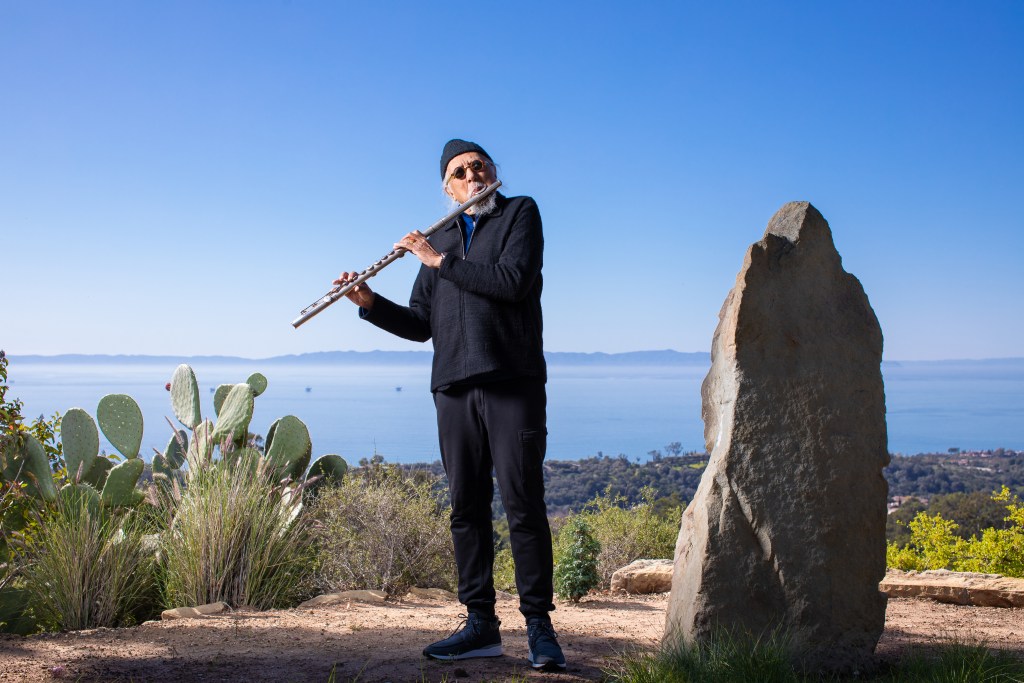




You must be logged in to post a comment.